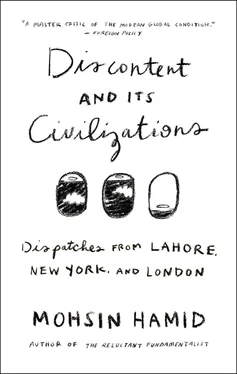Recently we’ve been treated to many shows that seem better than any that came before: the brilliant ethnography of The Wire , the dazzling sci-fi of Battlestar Galactica , the gorgeous period re-creation of Mad Men , the gripping fantasy of Game of Thrones , the lacerating self-exploration of Girls . Nor is TV’s rise confined to shows originating in only one country. Pakistani, Indian, British, and dubbed Turkish dramas are all being devoured here in Pakistan. Thanks to downloads, even Denmark’s Borgen has found its local niche.
I now watch a lot of TV. And I’m not alone, even among my colleagues. Ask novelists today whether they spend more time watching TV or reading fiction and prepare yourself, at least occasionally, to hear them say the unsayable.
That this represents a crisis for the novel seems to me undeniable. But a crisis can be an opportunity. It incites change. And the novel needs to keep changing if it is to remain novel. It must, pilfering a phrase from TV, boldly go where no one has gone before.
In the words of the Canadian writer Sheila Heti: “Now that there are these impeccable serial dramas, writers of fiction should feel let off the hook more — not feel obliged to worry so much about plot or character, since audiences can get their fill of plot and character and story there, so novelists can take off in other directions, like what happened with painting when photography came into being more than a hundred years ago. After that there was an incredible flourishing of the art, in so many fascinating directions. The novel should only do what the serial drama could never do.”
Television is not the new novel. Television is the old novel.
In the future, novelists need not abandon plot and character, but would do well to bear in mind the novel’s weirdness. At this point in our technological evolution, to read a novel is to engage in probably the second-largest single act of pleasure-based data transfer that can take place between two human beings, exceeded only by sex. Novels are characterized by their intimacy, which is extreme, by their scale, which is vast, and by their form, which is linguistic and synesthetic. The novel is a kinky beast.
Television gives us something that looks like a small world, made by a group of people who are themselves a small world. The novel gives us sounds pinned down by hieroglyphs, refracted flickerings inside an individual.
Sufis tell of two paths to transcendence: one is to look out at the universe and see yourself, the other is to look within yourself and see the universe. Their destinations may converge, but television and the novel travel in opposite directions.
(2014)
I REMEMBER, as a boy in Lahore, the moment I learned Pakistan had become, once again, America’s ally. I was with my cousin in front of my grandfather’s house. It had been raining, and water stood an inch deep on the lawn. Armed with three bricks, the two of us were battling nature. I would put a brick down and move onto it, my cousin would step onto the one I had left, and then he would hand forward the brick he had been standing on a moment before. We were most of the way across when my mother told us to come in. The adults were watching the news. I was told we were now allied with America against the Soviets in Afghanistan. Cool, I thought. We were with the good guys and we would win. I had seen enough cartoons and films to have no doubt about it.
The war went on for the rest of my childhood, but it was mainly a distant, faraway thing. Still, as I got older I began to realize that odd things were going on. Our dictator was giving speeches about transforming Pakistan into a society based on his interpretation of Islam. Painted images of F-16s given by America were appearing on the backs of buses under the words “God is great.” Armed college students were telling women to cover their heads.
I went to college in America soon after the Soviets were defeated. Surprisingly, few Americans I met seemed to think of Pakistan as an ally. Fewer still knew where Pakistan was. After the war, America turned its back. Aid and military supplies were cut off. My friends at home were shocked by this. I, living in America, was less surprised. In America, the murky, unknown places of the world are blank screens: stories of evil can be projected on them with as little difficulty as stories of good.
Now Pakistan is once again dragged into the front line. There was already tension in Pakistan between the graduates of religious madrassas and those of state and private schools. But since the last Afghan war, Pakistan has been struggling toward a compromise between these groups. Such compromises evolve slowly, and are nourished by stability. In acting now, Americans must consider the consequences of projecting a war film onto what is not a blank screen at all. They must have compassion as they weigh the impact of polarizing millions of people in the name of justice. In Pakistan, my friends and family are frightened, as they should be when the most powerful military in the world is sent to do a task best accomplished by schoolteachers, police forces, persuasion, and time.
(2001)
WHEN I MADE a reporting trip to Pakistan’s rugged Balochistan province in 2004, I expected to encounter strong feelings against the central government in Islamabad. Balochistan was in the grip of a low-level insurgency, with tribesmen demanding greater autonomy for the province. Just days before my trip, a roadside bomb in the Baloch fishing village of Gwadar had killed five Chinese engineers working on Pakistan’s premier development project: a massive new port. So I was surprised to see children in Gwadar playing cricket in replicas of the uniforms of Pakistan’s national team. In fact, the only hostility I encountered was from aggressive undercover security agents who questioned me rudely and threatened to seize my camera.
Afterward, a shop owner, overhearing me complain on the phone about my treatment, invited me to his home for lunch. “The army is disrespectful to us,” he said. “They take away our young men and beat them for no reason. We are Pakistanis, but they treat us like foreigners.” And so, in his opinion, did the central government. “None of the work on the port has gone to people from Gwadar,” he added. “They are spending billions of rupees on it, but they have not even built us a proper hospital.” Like the children playing cricket, he seemed to consider himself very much a Pakistani. But he resented Islamabad’s heavy-handed approach and the troops it deployed to enforce its policies. I left Gwadar with new sympathy for the Baloch and their desire for more say in their affairs.
Two years later, the insurgency in Balochistan has grown. And last week’s announcement by the army that it has killed Nawab Akbar Khan Bugti is a sign that the military has failed to understand that its belligerent tactics only make matters worse. Bugti was a rebel leader and a member of an oppressive class of tribal chieftains who control much of Balochistan as their personal fiefdom. But he was also a former governor of the province and a respected elder to many Baloch. His death, which has triggered unrest and rioting in Balochistan, is symbolic of our government’s refusal to address the grievances of large numbers of Pakistanis who feel ignored and marginalized by Islamabad’s policies. Most Baloch, for example, believe they do not receive a fair share of the revenues from the natural gas produced in their province.
I was originally opposed to the 1999 coup that brought the president, General Pervez Musharraf, to power. But after 9/11 and the war against the Taliban in Afghanistan, he seemed to offer a steady and in some ways liberal hand during a period of great uncertainty for Pakistan. Under Musharraf, we have witnessed rapid economic growth and a soaring stock market, a liberalization of private media outlets, and the resumption of a peace process with India. But that sense of hope is now fading. One of the legacies of seven years of rule by the army chief is a Pakistan that has become deeply divided.
Читать дальше












